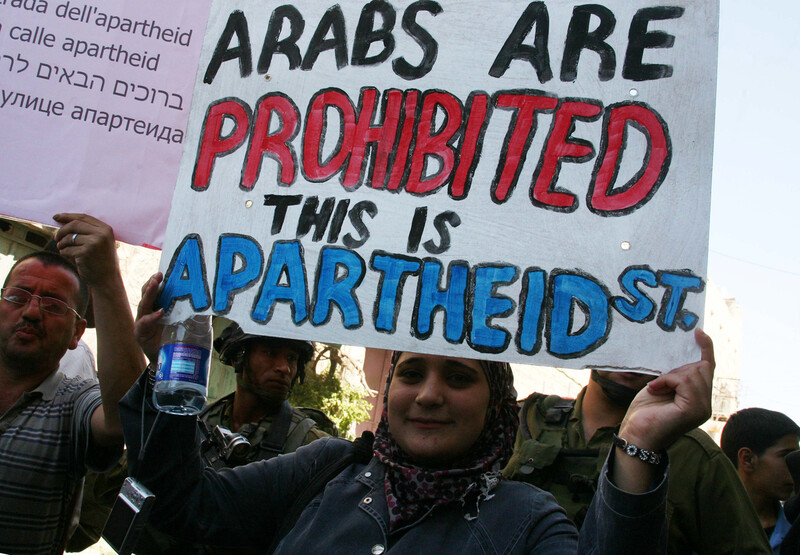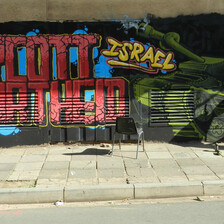The Electronic Intifada 2 October 2012

People around the world increasingly agree with Palestinians who say they live in an apartheid system.
APA imagesThe documentary film Roadmap to Apartheid, directed by Ana Nogueira, a white South African and Eron Davidson, an Israeli Jew, has won a number of awards at film festivals around the world. The film takes a close look at the apartheid comparison often used to describe the Israeli-Palestinian conflict. It draws on the many lessons from the South African experience relevant to conflicts all over the world. It breaks down the rhetorical analogy into a fact-based comparison, noting where analogy is useful and appropriate, and where it is not.
The film is as much a historical document of the rise and fall of apartheid, as it is a film about why many Palestinians feel they are living in an apartheid system today, and why an increasing number of people around the world agree with them.
The Israeli-Palestinian conflict is complex. However, the experience of the South African conflict tells us that there is always hope. Our government has positioned itself to play a facilitating role in the peace process by being one of the first countries to have diplomatic relations with both Israel and Palestine.
Non-governmental initiatives undertaken in this country include the ongoing campaigns by the Palestinian solidarity groups, the hosting of the third session of the Russell Tribunal on Palestine and the boycott, divestment and sanctions campaign aimed at increasing pressure on the Israeli government to negotiate, a strategy that proved successful in South Africa. The Russell Tribunal held hearings in Cape Town and concluded that Israel had committed crimes of apartheid, as defined by the United Nations apartheid convention. The 1973 apartheid convention was the ultimate step in the condemnation of apartheid and declared it to be criminal.
My introduction to the conflict was at the United Nations world conference on women in Nairobi in 1985 where heated debates took place. We were more concerned about our own struggle and I did not gain much of an understanding then. When I came to parliament I lead the South African delegation to the Interparliamentary Union and discovered that while Israel was a member, Palestine was only an observer.
The debate of whether or not to admit Palestine as a member raged on for many years. It was only in 2008, when South Africa, as host under the leadership of our former parliamentary speaker, Baleka Mbete, that Palestine was finally admitted into the IPU.
Intimidation
In 2008 I joined a delegation of South African human rights activists to visit Israel/Palestine. The invitation for the South African human rights delegation had come from Israeli and Palestinian organizations that work together for peace. The purpose was to provide an opportunity to witness first hand the situation in the occupied West Bank. The other aim was to support what we understood to be a new and small movement of Palestinians and Israelis involved in joint nonviolent struggle for peace, which shows great promise.
Our first taste of what was to come was the detention for questioning of lawyer Fatima Hassan at Ben Gurion airport in Tel Aviv. Among the questions she was asked was the origin of her Muslim name. Apart from the apparent prejudice, there did not seem to be any logic to this behavior, other than to intimidate our delegation. The intimidation was repeated when we visited Hebron, where three local hosts were detained in police cells, whereas the Israeli settlers, who had been threatening us, were ignored. This reminded me of the arbitrary arrests and detention in South Africa that we had got accustomed to under apartheid.
My husband, who was part of the delegation, had shared his experience of living in Palestinian villages, where he had visited for six months as an “ecumenical accompanier” with a World Council of Churches program. The accompaniers support Palestinian and Israeli activists working for peace, observe the situation in Palestine and work when they return home to influence public opinion and foreign policy to end the occupation.
On visiting the Balata refugee camp in Nablus, I was struck by how Israeli soldiers treated the people with a lack of respect for their dignity. My special concern was generations of Palestinian children who grow up under these conditions. Visiting the Holocaust museum at Yad Vashem, it was hard to imagine how survivors of the Holocaust could be so insensitive to the hardship and inhumane treatment of Palestinians, under Israeli occupation.
Compelling comparison
The comparison between the Israeli occupation of the West Bank and Gaza and apartheid South Africa is compelling. The comparison between the requirements for a peaceful solution is strikingly similar for two peoples living on the same land; the need to provide freedom for the people without freedom, and provide security for the people who hold the power but feel threatened by the peace process. When we look at the problems we have in South Africa today, they pale in comparison to those we had in the 1980s, and it is not even imaginable what it would have been like had we not reached a settlement. Looking forward in Israel/Palestine, one can only wonder at the potential that would be unleashed if a settlement were achieved.
Roadmap to Apartheid ends with the words of South African poet, Don Mattera, who optimistically declares when discussing the dream of free and equal society in historic Palestine, “It is possible. It is possible.” This made me think, as the pictures of maps of the extent of Israeli settlements in the West Bank made it clear to me how difficult it would be to achieve a two-state solution. This is the basis of the only plans that are being discussed at the moment, the “roadmap” of the Middle East Quartet (the US, UN, European Union and Russia) and the Arab peace plan.
To a South African the two-state solution can’t help sounding like apartheid. Perhaps it takes a poet to convince us that we need to look to our common humanity to find the solution. The working together of ordinary Palestinians and Israelis in search for peace inspires hope.
This article first appeared in the print edition of South Africa’s Sunday Tribune and is republished with permission.
Nozizwe Madlala-Routledge is a South African politician who was deputy minister of defense from 1999 to 2004 and deputy minister of health from April 2004 to August 2007.



Comments
To their nauseating end
Permalink Anthony Shaker replied on
Thank you for your interesting insight. You wrote: "Visiting the Holocaust museum at Yad Vashem, it was hard to imagine how survivors of the Holocaust could be so insensitive to the hardship and inhumane treatment of Palestinians, under Israeli occupation."
There is a simple answer to this "riddle." When everything in your own life and the life of your community and the borderless colony you live in is a lie, then your only option, it seems, is to blame the victim with classic Israeli grotesquerie--"They did it to themselves" and "They've been living rent-free for centuries on our land...time to go!").
It has nothing to do with the Nazi holocaust, except in the minds of the worst human dregs we have the misfortune of hearing down to their nauseating end.
reply
Permalink Eugene replied on
Though, I can't see the original comment to which you reply, I would like to reply to yours -
To say that the existence of Israel has nothing to do with the Holocaust is foolish and shows a lack of knowledge about the subject. Please try harder next time.
The Charge of Apartheid and Israel
Permalink Bernard Katz replied on
Nozizwe Madlala-Routledge is absolutely correct about Israel having fomented an apartheid regime in its occupation of the West Bank. It's interesting, however, that she never charges Israel with being an apartheid state INSIDE Israel 'proper' - ie. inside the Green Line. The popular fiction is that both are correct, but that is not the case in my opinion. There is shocking racism and discrimination inside Israel. There is no apartheid despite that situation, as defined by the two international conventions - the UN's International Convention on the Suppression and Punishment of the Crime of Apartheid (1973), and the 2002 Rome Statute of the International Criminl Court. The situation in the Occupied Palestinian Territories fulfils their criteria, whereas the situation inside Israel, discriminmatory as it is, does not. Prominent critics of Israel's policies, such as former President Carter in his book Palestine Peace Not Apartheid (2006), recognize this. Please read my essay "Still more on Israeli apartheid", published in Outlook (p. 15-16, 37 in May/June, 2012), Canada's progressive Jewish magazine. Unfortunately it is not available online, as they do not publish every article online.